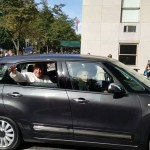Out on the Dance Floor
The Pope has come and gone, with countless people either seeing him for real –including two of my very best friends –or wondering what’s he’s about; we’ve watched the moon get enveloped in a red shadow and then learned that there’s likely water on Mars.
Meanwhile, I just keep trying to make sense out of, on the one hand, organized religion and the way different people depict God; and on the other hand, the vast universe and what we actually know about it. Do we have lift-off here?
I won’t say “the divide between” because there need be no inherent contradiction between the world of Faith and the world of Science. Right? And yet, there is plenty still to wonder about. What’s a curious girl – OK, a creeping towards the upper realms of middle-aged woman who also happens to be a bishop’s wife– to do but read, seeking some flashes of light if not some real answers?
Even when I go about my daily rounds not particularly thinking about these matters, which some may claim are neither here nor there, I’m apt to run into a poster like this one at the hair salon. Now you tell me if this is a reasonable claim…
Ok, so this must be a joke, and there’s not much real science in the height of hair. But maybe somewhere someone actually believes it?
These days, I’m hearing fewer Bible passages because I’m going less often to church, partly because the children have scattered and partly because the one familiar destination has turned into many far-flung ones. I am, however, travelling far (a la my mentor Emily Dickinson) by devouring books. I feel drawn to fiction and non-fiction both, but my specialty of late, strangely enough, has been anything with “God” or “Faith” or “Jesus” together with “Science” or “Nature” or perhaps “Infinity” or “Stars” in the title. Hey, nobody can accuse me of reading on the puny end of the shelf, anyway; I’m zooming in on the Big Questions.
Even the light reads often have something to do with the Universe; take The Astronaut Wives Club, for instance. I try not to be distracted by those flipped hair-dos; these women were dealing with some pretty serious distances in their marriages.
This all may have started in earnest when I sought out Jane Hawking’s memoir, Travelling to Infinity (Alma Books, London, 2007). She is the ex-wife of the famous Stephen Hawking, and her book was the basis of the wildly popular movie The Theory of Everything. It’s a riveting story all right. You’ve really got to hand it to her: even though her own areas of expertise were languages and music, she managed to understand a whole lot about what her genius physicist husband was figuring out, too. And she followed much of his mind-voyage out into the stratosphere and into black holes while also coping with his “motor neuron disease,” dealing with all the complications when he travelled around the world to give talks, as well as caring for their three children. It was exhausting. Then, sadly, they parted.
Through it all, she maintained a steadfast belief in God, often wishing that he could make more room alongside his famous theories for the religious faith that, she believed, would help sustain him. However, according to her account, he remained standoffish and often scathingly dismissive of the Anglicanism that was part and parcel of their community.
And yet, as I discovered when I went back to look again at his blockbuster for the common folk, A Brief History of Time (Bantam Books, 1988) which was dedicated to Jane, Stephen Hawking definitely did not leave God out. True enough, most of the book sticks closely to the scientific discoveries – a good thing, too, in that there’s a whole lot to digest – but he does tip his hat to God on more than one occasion. Here, for instance:
One possible answer is to say that God chose the initial configuration of the universe for reasons that we cannot hope to understand. This would certainly have been within the power of an omnipotent being, but if he had started it off in such an incomprehensible way, why did he choose to let it evolve according to laws that we could understand? (p. 122)
Reading a passage like this, I begin to conjure an image of God and Science as dance partners. Admittedly, this could be partly because I’ve just gone to a string of events (two reunions, one wedding, one huge anniversary celebration for a school) when the much hoped-for opportunity to dance either did or did not pan out.
But, honestly, the more I read, the more I see all kinds of people depicting the interplay between these forces — the weaving in and weaving out, the constant movement, and even the sharing of who’s in the lead.
A brand new book I picked up on this topic is almost mind-blowing. There’s a kind of parallel here with the Hawkings, actually: Nancy Ellen Abrams is married to the astrophysicist Joel Primack; he studies “dark matter.” In A God That Could Be Real (Beacon Press, Boston, 2015) she’s arguing that it’s time for us to create a wholly new kind of God – to lose the old, stale ways of thinking about an omniscient/omnipotent Being and see instead an “emergent phenomenon” in keeping with what our society desperately needs to move forward, completely in tandem with the exploding knowledge we have from Science.
In his Foreward to the book, Archbishop Desmond Tutu begins this way:
I must begin by acknowledging that I do not agree with everything that Nancy Abrams says about a scientific understanding of God. (ix)
Well, phew, that’s a relief. Sure would be boring to see everybody dancing the same way out on that floor, wouldn’t it? Hey, this party is bound to go on for quite some time. If I’m patient, and the music is right, I might even persuade my husband to come on out there with me for a while…though it might have to be in the mid-week time slot.





